With its privileged position in the sub-region, Nigeria is poised to play a pivotal role in ECOWAS. But Nigeria’s elites and its public policies must show that they are up to this challenge.
A Decisive Economic Influence in the Sub-Region. Both within and outside of the country, Nigeria’s vocation to dominate and structure the sub-regional environment is no longer contested, and Nigeria is expected to play a key role in African and international organizations. The time is long past when, in the late 1960s, the country’s internal problems and the prospect of a rise in power due to its petroleum riches and geographical size led some to hope that Nigeria would be split into a number of micro-States. Since the 1970s, the development of trade between Nigeria and its neighbours, rooted in the history of pre-colonial societies and in the networks of brotherhoods found in northern Nigeria, has lost none of its vitality, now stimulated by the large diaspora of Nigerians across West Africa. Nigeria has become a central locus, given its abundant resources, demographic weight, and its attractiveness to neighbouring economies. Tightly linked to fluctuations in Nigeria’s economy, economies throughout the sub-region are de facto increasingly tied to the Nigerian economy.
A Strategic Security and Energy Position.Since the 1990s, the government of Nigeria has contributed decisively to expanding the scope of ECOWAS’ mandate beyond its economic objectives to include the issues of people’s security and governance. This evolution was formalised under the 1999 protocol and largely reiterated in the act constituting the African Union, drawing lessons from the ECOWAS/ ECOMOG [[The economic Community of West African States Monitoring Group (ECOMOG) is an intervention force established by the Economic Community of West African States (ECOWAS) to monitor the cease-fire]] intervention spearheaded by Nigeria in Liberia and Sierra Leone. Lastly, the decade that has just ended has, above all, seen Nigeria’s net worth rise even more, undoubtedly due in part to the end of military rule, but also and above all due to the quality of oil resources and the proliferation of promising discoveries in a region of western Africa that has become of strategic interest since the events of September 11, 2001.
The Weakness of Public Policies. Today, however, encouragement for Nigeria’s role as a State power comes hand in hand with growing doubts about the unwanted effects of a political system that is known for its poor capacity to produce public policies. The end of military dictatorships has not helped calm the internal tensions intrinsic to the operation of a federal system explicitly based on highlighting and codifying geo-ethnic identities and divisions under what is called the “federal character” doctrine. Because access to resources and positions is determined by blood right alone (jus sanguinis), the “non-indigenous” population groups in any given state are the victims of discrimination that fuels recurrent tension. Fraught with massive electoral fraud in 2003 and 2007, the Nigerian political system is still awaiting broad constitutional reform. A prime issue at stake is a thorough review of the system of balances on which the country successfully rebuild itself after the civil war of 1967-1970. Until this issue is resolved, the underlying problems will continue to aggravate the crisis in the political system, the symptoms of which regularly make the headlines, such as the protests in the Niger Delta against the grabbing of oil revenues by just a few people, the instrumentalisation of religion (the adoption of Sharia law in twelve northern states, attacks by the Boko Haram movement in the North), and above all violence between “indigenous” and “non-indigenous” populations in Plateau state.
Corruption and the Informal Economy. While Nigeria has shown a remarkable capacity for self-analysis (as attested by the work of various constitutional bodies over the last thirty years), the capacity for reform continues to be hindered by the mediocrity of the elites holding positions of power. Some point to Nigeria as a prototypical example of private interests taking over the public domain, creating a neopatrimonial and anti-developmental State, and Nigeria has indeed shown very little capacity to elaborate and implement public policies. If truly competitive elections are held in 2011, it is to be hoped that this will renew the political personnel and support the efforts of organizations in charge of combating corruption. Thee appointment of Attahiru Jega as chairman of the election oversight commission, and the presence of Nuhul Ribadu, former chairman of the Economic and Financial Crimes Commission, as a candidate in the presidential primary election, are two developments that have the considerable merit of focusing the spotlight of the debate on the issue of people’s and politicians’ integrity. Without progress in this area, Nigeria’s implication in the sub-region will continue to rely heavily on what could be called integration “by default”, more dependent on the development of unofficial trade than on the proactive implementation of policies and strategies.







